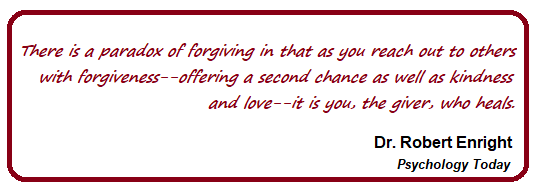Tagged: “Love”
Forgiveness Can Expand Your Vision
When we are consistently angry over deep injustices against us, it can narrow our vision. We think about the person and what happened, we dream about the person, we can become preoccupied with the past.

Image by Pexels.com
In contrast, when we forgive, we see both a more complete person in the one who acted badly and an expanded hope for the future. As we forgive one person, we often are motivated to forgive others. As we continue to forgive, there often develops in us a motivation to assist others in their suffering. Our vision expands so that we see beneath the surface of others. We see their pain……and we want to help. As we continue to forgive and to aid others in their suffering, we can begin to expand our view of humanity, of who each person is as someone of inherent worth, special, unique, and irreplaceable.
As we forgive, we expand our vision of: a) the one who hurt us; b) hurting people in general; c) and humanity in general. The expansion tends to be what Lewis Smedes used to call “seeing with new eyes.” These are eyes of expansion, toward greater positivity and hope for humanity. These are eyes of expansion in seeing the self in new ways, with a new meaning and purpose in life for others.
Forgiveness is part of love and beauty and so as we forgive, we become more attuned to both love and beauty and want to contribute more of these into the world. The expanded vision does not lessen what happened, but it makes what happened more bearable as healing takes place and love expands.
![]()
What Are the Implications for Forgiveness if We Take the Materialist Perspective that Free Will Does Not Exist?
Nine years ago, I was asked this same question. It is starting to arise again as people consider the materialist philosophy that circumstances and issues other than free will choices determine how people behave. I introduce my answer from 2014 here and add to it. The conclusion remains: Free will is necessary if we are to understand right and wrong and even if we are to understand forgiveness.

(Image by Pexels.com)
We are all connected and so one person’s actions are not necessarily independent from others’ actions. Is this true? Some Eastern philosophies say this. Some Western psychologies say this, too. For example, family systems theory surmises that a misbehaving child likely is being influenced by pressures within the family generated by others’ behavior both inside and outside that family. Psychodynamic theories in psychology say that an adult’s actions can have causes going back to how this person was treated as a child.
Given all of the interrelated ideas above about our being interrelated in our actions, we can then make at least two moves in explaining people’s behavior: 1) no one can truly help certain actions because of others’ influences over us or 2) we all have free will and choose to act rightly or wrongly even if others’ make it hard to be good.
If we take the first turn on our journey of understanding persons, then we weaken such ideas as “right and wrong,” “justice,” and “forgiveness.” After all, how can we say that one person acted wrongly? if we are all so interconnected, then this person is not acting with any kind of genuine volition. In a certain way, his misbehavior can implicate his father, who can implicate his mother, who can implicate……..On it goes until we all share the blame which weakens the case against the original person and his actions under consideration.
If we take the second turn on our journey of understanding persons, then we strengthen such ideas as “right and wrong,” “justice,” and “forgiveness.” After all, the person, even though pressed in on all sides by others, has choices. One need not, for example, hit another person because of frustration. One’s mother has not so abused this person that she was left with one and only one option. Yes, the mother’s misbehavior (whatever it was) may make it difficult for the daughter to control her temper, but control it to a degree she can.
Free will. Independent choices. Break the laws of morality (you will not take the life of an innocent person, for example), and you do wrong. If the wrong is done to me, I can forgive. If the other does not have free will, then an apparent wrong is just that—-apparent. Do I then forgive a person for a wrong? The conclusion is no longer clear. We will have to redefine forgiveness in this case to retain the use of the word “forgiveness.” Forgiveness becomes a kind of acceptance of all along with their actions, no matter how wrong they might appear to be. We still retain such words as “compassion” and “understanding,” but the word forgiveness itself begins to fade.
If the world ever loses the word forgiveness and its true meaning, we are in very big trouble. Inner unrest and conflict within families and communities may know no end. To retain this vital concept, we must retain the truth of free will for each person.
![]()
Future Forgiveness
Your practicing forgiveness now may pay unexpected dividends for you decades from now. As an example, a person visited me when her husband unexpectedly left her and her two children, whom she now is raising on her own. This is her view of the situation: “I have been practicing forgiveness now for many years under many different circumstances. Forgiveness has become my friend. I know how to forgive my husband. Had I not taken the time over the years to forgive different people, to nurture forgiveness in my heart, I could be in big trouble now, with a big bag of resentment that I could be carrying with me. This will not happen…..because forgiveness is my friend.” Each decision to forgive and each act of forgiveness now may pay great dividends for you and others 20 years from now.
Perseverance is a key. I have found that one of the greatest challenges to growing in forgiveness is a failure to adhere to practicing it as a moral virtue. People become distracted, they focus on new approaches to life, and they let forgiveness fade in them. As an analogy, how often do people take out a new membership in the gym, enthusiastically start a physical fitness regimen, and then slowly give it up? Diversions interfere and a habit of going to the gym never develops.
Developing a love of the forgiveness moral virtue is one way to avoid diversion, of avoiding distraction from the conscious and deliberate commitment to keep forgiveness as a vital part of one’s human interactions. As a person practices forgiveness over time, sees the beauty of it, sees the potential for aiding the self in reducing resentment and aiding others with the second chance, it is here that one starts to develop a love of the virtue. With the love now in place, perseverance becomes easier and it is easier to pass forgiveness to others.

from Pexels, used with permission
A love of the moral virtue of forgiveness can lead to it becoming a part of your identity, a part of who you are as a person. In other words, we all have a sense of who we are by focusing on what is important to us in life. Some may say, “I am a teacher,” or “I am the parent of two beautiful children,” or “I am a bicycle enthusiast.” We tend to look upon ourselves mostly through the lens of what we value. Once forgiveness starts to grow in you, then continued perseverance is more likely. The more you persevere in forgiving, the more you see its beauty and develop a love of the virtue. The more you develop a love of forgiveness, then the more likely it will become a valued part of who you are: “I am a forgiving person.” It is here that you want to give it away to others for their good. You then are helping people strengthen against the potential ravages of deeply unfair treatment from others that can lead to trauma within. Forgiveness is a protection against these negative effects. Persist in practicing forgiveness now, even for the minor annoyances, and protect yourself when deep unfairness comes; persist in practicing forgiveness now, and grow toward helping others to forgive, as a protection for them when deep unfairness visits them.
Forgiveness today is an investment in your future……and in others’ future.
![]()
Given that you deal with people who are deeply hurting, does this affect you emotionally? In other words, is it hard to deal with all the pain all the time?
The key issues are hope and passion for the work. Hope occurs when I see that hurting people can be healed. This increases my passion for the work, knowing that others need to hear the message of forgiveness and can greatly benefit by walking the forgiveness path.
The Backlash Against Forgiveness Continues
In a recent blog at Psychology Today, I examined “14 Popular Criticisms of Forgiveness.”
The gist of that essay is this: Many people generate their own opinions about why forgiveness is inappropriate, dangerous, disrespectful, and/or confusing, but their defense of these assertions is always, and without exception, philosophically flawed, rendering the opinion unfounded.
Well, I came across yet another set of criticisms against forgiveness and I would like to address them here. As I often do, I will not identify the author(s) because the point is to examine ideas, not persons. So then, let us begin.
1. Encouraging forgiveness might short-circuit the anger process. In other words, people tend to need a time of anger, which shows self-respect. So, don’t encourage. This, of course, is not a critique of forgiving itself. Instead, it is a criticism of those who might put pressure on others who need a time of self-reflection to work out the anger first. Our Process Model of forgiveness, since its creation over three decades ago, always has called for a period of anger and self-reflection as needed by the forgiver. Thus, forgiveness itself and even the encouragement of others to forgive are not the problems. In the case of encouragement, this depends on how the well-meaning person goes about trying to encourage another person to forgive. Is it with gentleness and understanding or is it with at least a pinch of force (which should not happen)?
goes about trying to encourage another person to forgive. Is it with gentleness and understanding or is it with at least a pinch of force (which should not happen)?
2. If you encourage people to forgive, then this might short-circuit the quest for justice. As with point 1 above, this criticism is not about forgiveness at all, but about the philosophical mistake of thinking in an “either-or” way about justice and forgiveness. It is not the case that one must choose between these two moral virtues. The criticism against forgiveness itself fails to take this into account.
3. An abuser who asks for forgiveness might be manipulating the victim into the status quo of more abuse against this victim. Again, the issue is not with forgiveness itself, but instead is a problem centered in the poor intentions of the one who asks. The one who might forgive certainly should scrutinize the motives of the one asking for forgiveness. This is plain common sense. In other words, again we have the situation in which forgiveness might be taking the blame for those who fail to ascertain motives in those who behave badly.
4. Suggesting forgiveness by groups that have been oppressed is abusive because this might perpetuate the abuse. Once again, we have a philosophical error in assuming that groups must choose between forgiving and seeking justice: Forgive and then say goodbye to the hope of a fair solution. This is reductionistic thinking. Let us help people to see that as groups consider forgiving, they should scrutinize the best way forward for a just solution to seemingly intractable social problems.
The backlash against forgiveness, I hope you see, is not about the moral virtue of forgiveness at all. Instead, it is about how people erroneously go about suggesting forgiveness or how people go about practicing forgiving. If the advice were centered on persons and how they go about the advice or how they go about the practice of forgiving, then all is well. When the criticism turns instead to forgiveness, it is time, as I have tried to do in this essay, to show the philosophical flaws in the reasoning of those who oppose the moral virtue of forgiveness.
![]()



